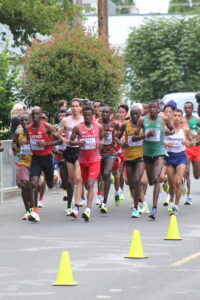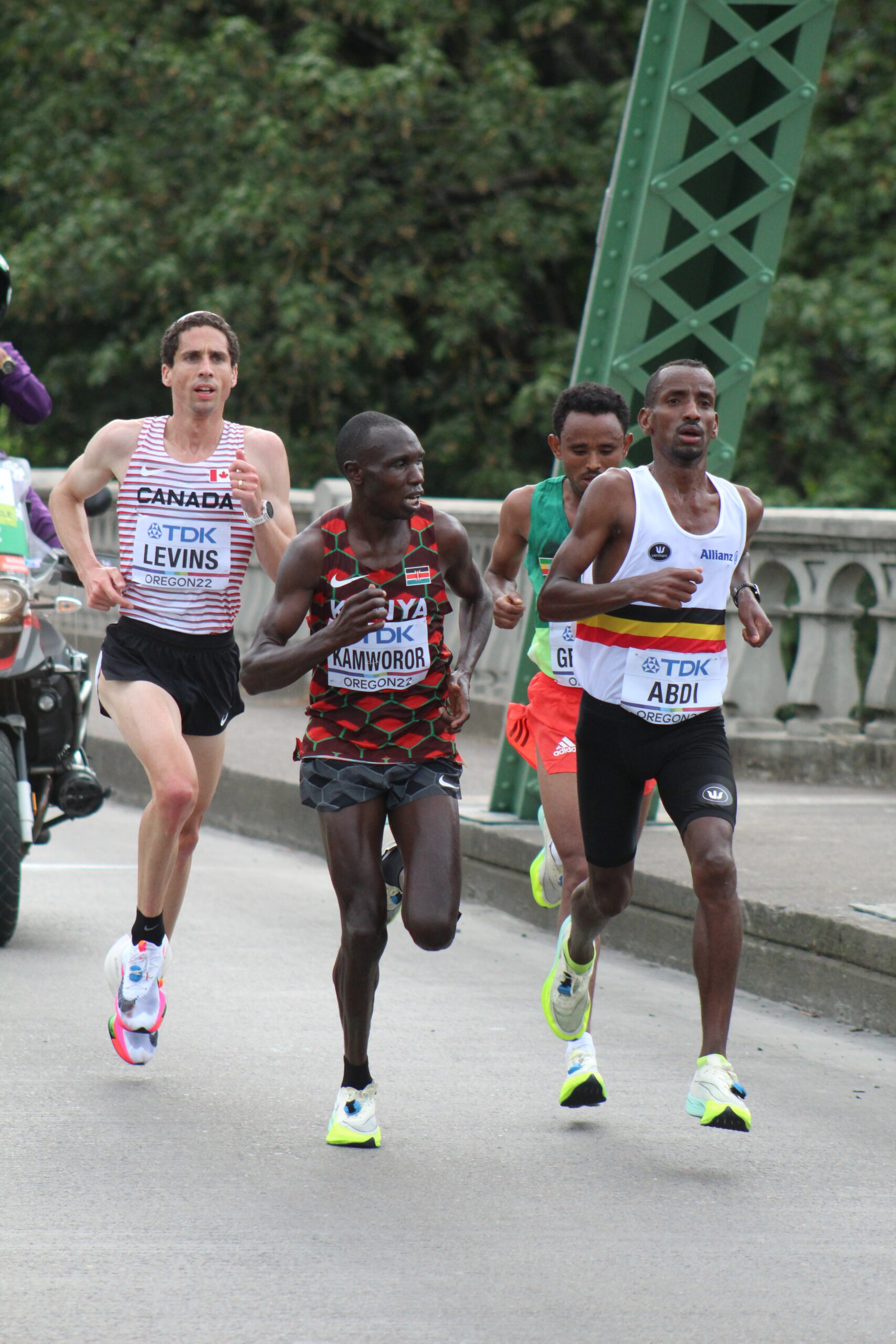
Cam Levins finished fourth at this year’s World Athletics Championship Marathon in a very competitive race, which saw a championship meet record and in the case of Levins, a Canadian National Record. While the NR already belonged to him, Levins bested his time by over two minutes, only a mere twenty-one seconds away from a medal position.
This was a great race, with a large pack most of the way. With about 10k to go, Levins broke with the main pack, which continued to dwindle in numbers. With 5k left, while the gold was largely out of reach, Levins and three other men still fought for silver and bronze.
This was certainly not Levin’s first foray on the world scene, as he raced in both the 5k and 10k at the London Olympics. At last year’s Tokyo Olympics, Levins struggled a bit in the marathon; however, he used that race as his motivation for Eugene.
Below, Levins discusses his race, training, and bounce back from Tokyo.
Chasing The Standard: Congratulations on your race at World Championships. You were 4th in the marathon, running a Canadian National Record (2:07:09). Coming into the race, what were your expectations? Did the race play out the way you wanted? It was a very tight pack for quite some time. Did that play to your strengths?
Cam Levins:Â Thank you, I was very pleased with my result across the board. Going into a championship race such as this, I was looking to place as high as possible, but I wasn’t entirely certain where my fitness would place me among such a deep field. I was expecting a tight pack since the Olympics were similar last year and felt far more prepared to handle myself in it. So, while I wouldn’t call it a strength necessarily, it was something I felt more experienced in dealing with this time around.
Chasing The Standard: What was the pace and development of the race during the World Champs marathon? Were there any early moves that were covered? At what point did you know it was go time?
Cam Levins:Â The pace shifted around quite a bit over the first two (14 km) loops before going consistently faster in the last loop. I felt relatively confident that early moves would be covered, without me having to do so, due to many athletes being bunched together for much of the race. Staying on my feet and conserving effort were my priorities while maintaining a position in the front group and waiting for it to thin out. Once there were fewer of us and it was easier to actually act upon any moves at the front of the race, I think was when I was prepared to take a more active role in racing.
Chasing The Standard: What did you think of the course? There were some narrow spots. Was there any jostling at those points?
Cam Levins:Â I overall enjoyed the course; I don’t mind loops since it can be another thing to focus on and help split up the length of the marathon. Lots of jostling and nearly fell a couple times, but I think the course would not have felt especially narrow if we had set a faster starting pace and stretched out even a little. It was awesome having so many people (including my family) able to stand at different sections of the course to cheer.
Chasing The Standard: What is your preparation in the week leading up to a marathon? Do you do anything differently than you would in a regular training week?
Cam Levins: At least for me, we try to keep consistent super short marathon paced sessions to avoid feeling sluggish, and relatively minimal amount of total daily running reducing as the week goes on. Looking to feel as good as possible while being fully rested.
Chasing The Standard: Last year in Tokyo you seemed to struggle a bit. Was that just a one off race? How did you recover to deliver this great performance?
Cam Levins:Â The Olympics were an especially bad race for me, but also led me to really increase and improve my training in response to it over the last year. I learned a lot from it and have worked harder than ever to reach a new level. No single race defines you, and I’ve been able to use it as motivation to improve so I don’t have that experience again.
Chasing The Standard:  You’ve always been a high mileage guy. Recently, though, it seems you have upped your mileage. What are you up to now for mileage? Do you run based on feel, or is your week planned out?
Cam Levins:Â I run around 170-180 miles most weeks, but my easy runs are based around time (not distance) and depending on workouts the mileage can vary between higher and lower. My coach, Jim Finlayson, sends me training a week at a time so it’s mostly planned by him.
Chasing The Standard:Â What advice do you have for distance runners looking to take their performance to the next level?
Cam Levins:Â IÂ think it’s simply about recognizing the areas you can still build upon or your weaknesses in training/competition and making appropriate changes to improve them. It can be very difficult to do so without bias, which is why having people who support you and you trust is important. Getting as much input and evaluation on how you are as an athlete can and should be a positive thing when you’re surrounded by the right resources.
Men’s Marathon Pictures
World Championships Men’s Marathon Results
Highlight Video of Men’s Marathon


